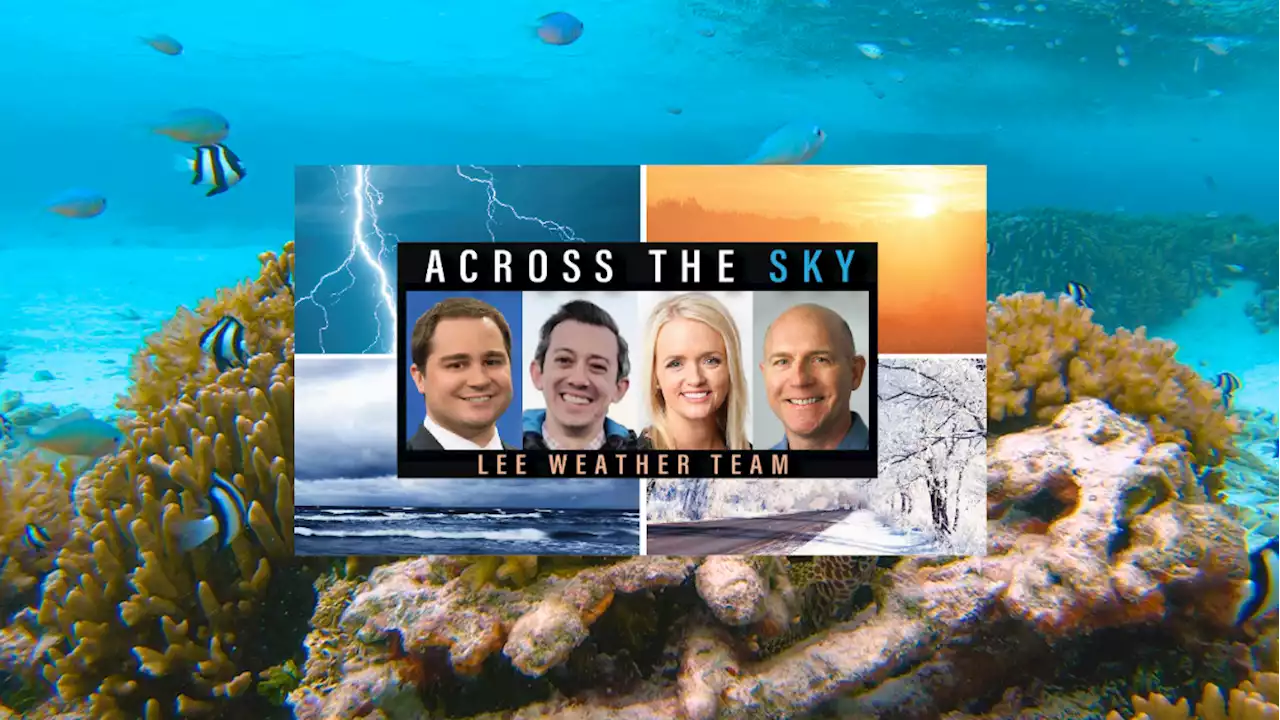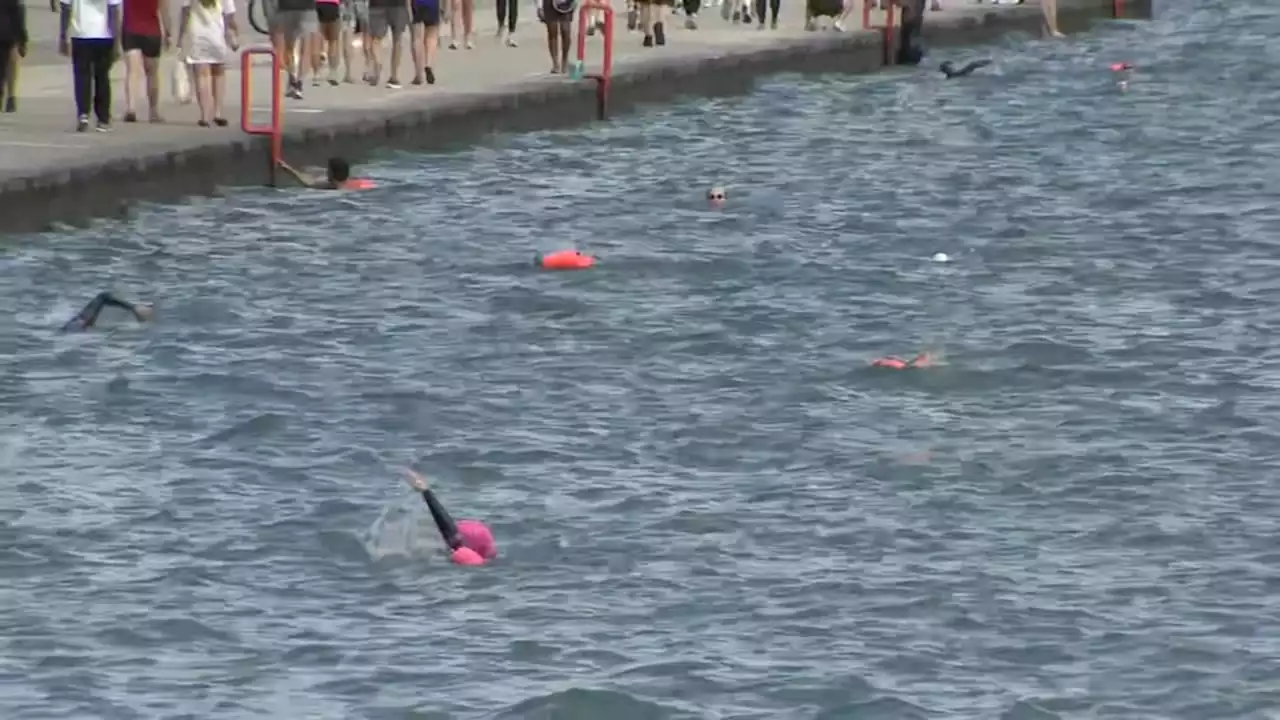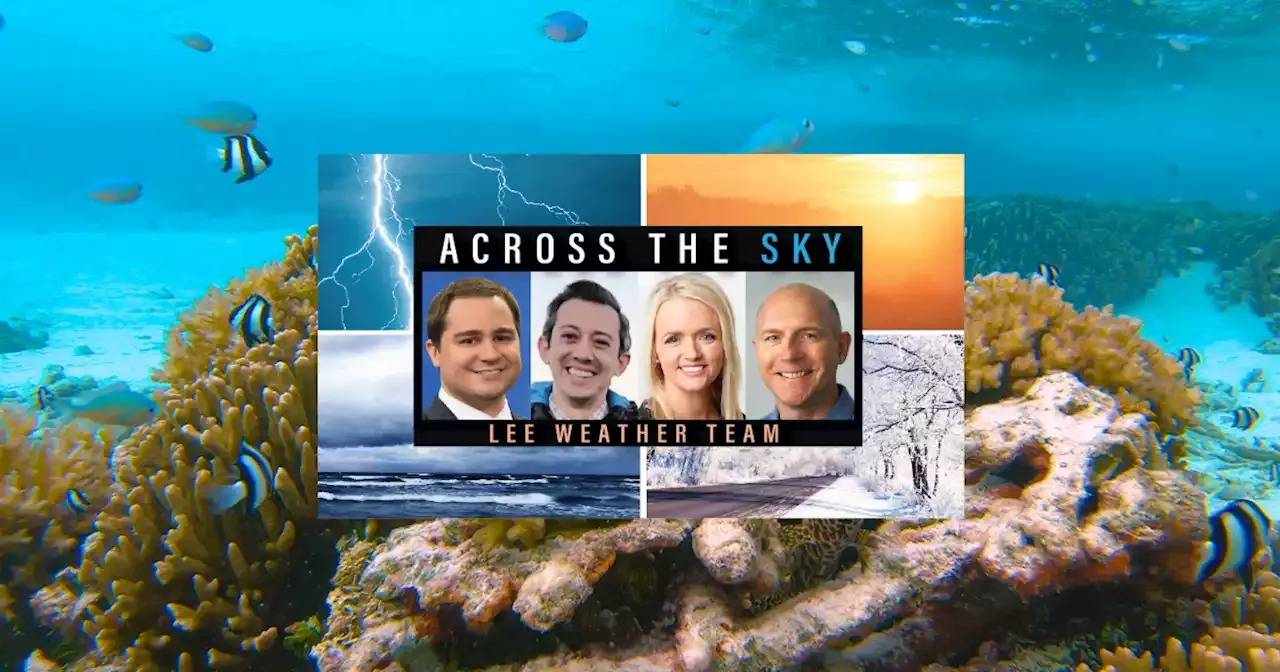Climate scientist Zeke Hausfather explains why oceans are at record-high temperatures on this week's episode of Across the Sky.
Listen now and subscribe: Apple Podcasts | Google Podcasts | Spotify | YouTube | RSS Feed | Omny Studio | All Of Our Podcasts Heat this summer has not been normal for most of the world. Globally, July 2023 was the hottest month on record, mainly because the oceans are at record-high temperatures.
A warming climate means more than just hotter summers | Across the Sky podcast Learn how a warming climate is sneaking up on us in subtle ways.The weekly weather podcast is hosted on a rotation by the Lee Weather team: So we wanted to kind of get into some of the reasons for that. Yeah, that's the headline I think grabbed people's attention. Of course, you know, as soon as there was those 100 degree temperature readings off the coast of Florida, then immediately all the headlines were Hot Tub water and everybody knows what a hot tub feels like. It's like, yeah, I don't think the ocean should just be naturally that hot if it's, you know, not being artificially heated.
So lots to get to with our conversation with Dr. Zeke Zeke Hausfather, let's go right to it. Dr. Zeke Hausfather father is the climate research lead for STRIVE and a research scientist with Berkeley. Earth is a climate scientist and IPCC author whose research focuses on observational temperature records, climate models, carbon renew, removal and mitigation technologies.
So in the early days we used to measure ocean temperatures by throwing wooden buckets over the sides of ships, pulling them up, sticking a thermometer in and writing it down in the captain's logbook. Funny story that actually had some biases because as you're pulling a bucket up the side of a ship, it evaporates. Some of the water evaporates off the top and that cools the remaining water in the bucket.
So we're really in the golden age of climate data, particularly when it comes to the ocean today. Real quick, before we talk a little bit more about this year, just for my own thing, in my own mind, I know the Argo floats have become very popular recently. Off the top of your head, an approximation, the you know, to a first order of magnitude about how many of these Argo floats are kind of out there right now.
So that's one area that scientists had to fill in the gaps a little bit. The other is the deep ocean. So our current Argo network mostly goes down to about 2000 meters or, you know, 6000 feet or so below that. We haven't had as many measuring systems historically. But there's a new deep Argo program that's trying to fill in some of those gaps.
But historically, the oceans have generally warmed at similar rates. This year, though, we've seen this really crazy warmth in the North Atlantic that is far beyond, you know, the level of warming we're seeing in other ocean basins. And so that's that's been really remarkable. And a lot of people have, you know, focused on that as a, you know, very unusual thing and tried to look at different potential explanations for it.
And once it gets dense enough, it starts to sink. And so that drives one of the big ocean circulations is the sinking of saltier water in the North Atlantic. But it turns out if you start melting Greenland really quickly, you dump much of freshwater into the North Atlantic and that can make it less salty, which then makes it not sink, which then can slow down and eventually shut down the circulation.
You know, we're really talking more about the European side of of the North Atlantic, where the biggest effects could be felt. And over the long term, you know, the effects of warming for most countries in Europe would outweigh the cooling issues associated with the shutdown. It still be bad. You know what affect rainfall patterns a bunch in problematic ways.
So let's start with the volcano and then talk a bit about sulfur. So there was a very large eruption in Tonga in 2022 of of an underwater volcano. And it affected the climate not by providing key to the oceans because the amount of heat provided by volcanoes, the oceans is actually pretty negligible on a global scale compared to the amount of heat that's being trapped by greenhouse gases.
That's a very wonky number. We used to estimate the amount of energy trapped in their system, but to convert them to numbers, people might understand, You know, we're probably talking about somewhere in the range of, you know, five hundredths of a degree centigrade of warming associated this volcano. So 0.05 C, which is not nothing but is not nearly as big as the, you know, excursions and temperature we're seeing globally.
And it actually radiates heat at the fourth power of temperature to get a little wonky. So you have this Stefan Boltzmann equation at work. And so what that means is that the hotter it gets, the more heat it's getting up to the atmosphere, the harder it is to warm up further because it's giving off more and more heat as it gets hotter.
Traffic in the North Atlantic may have played a role. Can you talk a little bit more about that? Sure. So when we think about climate change happening more broadly on Earth, you know, we know that the greenhouse gases we're putting in the atmosphere are warming the planet, but it's not the only thing that humans but the atmosphere. We also put a lot of sulfur dioxide into the atmosphere.
So historically, we've used pretty dirty fuel for ships. You know, it's sort of the fuel that's leftover from oil distillation that's too dirty to burn on land because it would tell us how old are clean air rules. We actually call it bunker fuel. So it's very like tarry goopy stuff that's leftover at the bottom of the stack after oil distillation, and it turns out is a very high sale for content.
And that's a pretty big deal. You know, in the recent IPCC report, our best estimate was that, you know, aerosols cooled the planet by about half a degree. C And so if you have a 9% reduction in one year going forward and all of aerosol emissions, you know, 9% of half a degree, C is still a pretty big number.
One is for my own mind, when we think about CO2 being kind of reflective, are we are you saying the CO2 molecule or as as an aerosol with other impurities and too, what is the the the general lifetime of CO2 and those aerosols in the atmosphere before they finally settle out? The reflectivity is primarily the sulfur molecule itself, but it is in an aerosolized form when it's sort of moving around the lower atmosphere, the troposphere, the lifetimes are generally talking about on the order...
It's a great question. You know, I haven't seen any research on no beetle effects of plastic. I think that even places like the Great Pacific Garbage Patch, which is a very evocative name, you know, it's not that dense. It's not like if you're going in a boat through there, it's just the surface of the ocean is covered with plastic.
And that's a broad question, but let's just just kind of attack where we've come, how far we've come in the last ten or 20 years and and how that might translate forward. Yeah. So so a decade ago, things looked really dire for the Earth's climate in terms of where we were heading. You know, global coal use had doubled over the course of a decade.
And so if you look at a bunch of different assessments of where we're headed today, and it's been done by the International Energy Agency and the United Nations Governmental Program and groups like, you know, Climate Action Tracker, they all more or less agree that, you know, we're headed for a world of of around three degrees C, maybe slightly below by 2100.
We continue to these positive trends and accelerate, and we actually do manage to limit warming to at least below two degrees by the end of the century. And I think unfortunately, 1.5 degrees is probably in the rearview mirror at this point, unless we, you know, do some crazy scenario where we pass it and then remove, you know, ridiculous amounts of carbon into the atmosphere to bring temperatures back down.
And that happens, you know, two more times after the initial one. Nina But because we rapidly transitioned from La Nina, conditions down, you know, conditions, you know, it's really added a lot of heat, particularly to the oceans. We expect the current El Nino events to continue and strengthen through the end of the year and, you know, stay fairly strong at least through early to mid 2024.
And that lag is about three months. So three months or so after you hit peak El Nino conditions, then you have the peak surface temperature response globally across the land and the oceans. And that's been a pretty consistent relationship for the past, you know, 80 years or so at least. So if that holds this time around, you know, and the El Nino peaks in the near the end of 2023, we expect sort of the biggest push to be on early 2020 for temperatures.
I mean, it's kind of a frightening plot or is it just one of those things like we really don't understand the Antarctic ice surrounding the continent as well? It's a signal, but we we really shouldn't panic about it. I mean, what is your take when you see that that kind of graphic of what's going on in the sea ice around Antarctica?
And we really have been at unprecedented lows for the entire year, particularly now, when sea ice should be growing rapidly. And it really isn't. And so there just needs to be a lot more work by scientists to untangle, you know, what are the drivers of this? You know, is it unusual warmth in Antarctica? Is it warm sea surface temperatures?
I think when it comes to the oceans, this is a particularly unique because we don't live in the oceans, we're on land. And so people kind of see the impacts of what's happening on land and where. So I think so many of us are ignorant about what's going on in the ocean.
But at the same time, you know, you can do a lot by supporting clean energy technologies because the more people who buy things like heat pumps or electric cars or put solar panels on the roof, the more the price of those technologies go goes down and the more other people can afford to adopt them and know we've really seen that with electric vehicles, which ten years ago were incredibly expensive and today are actually cheaper to own than a gas vehicle over the lifetime.
United States Latest News, United States Headlines
Similar News:You can also read news stories similar to this one that we have collected from other news sources.
 Why the oceans suddenly seem so warmClimate scientist Zeke Hausfather explains why oceans are at record-high temperatures on this week's episode of Across the Sky.
Why the oceans suddenly seem so warmClimate scientist Zeke Hausfather explains why oceans are at record-high temperatures on this week's episode of Across the Sky.
Read more »
 'What is that?': Green fireball blazes across Florida skyStargazers across Florida were surprised when a green fireball flashed across the sky.
'What is that?': Green fireball blazes across Florida skyStargazers across Florida were surprised when a green fireball flashed across the sky.
Read more »
 Man shocks airline passengers as his Great Dane flies cross-country, stretches out across two seatsAs a man traveled recently from Los Angeles to New York with his Great Dane, the huge dog made some people smile as it stretched across a couple of plane seats. The man's TikTok video went viral.
Man shocks airline passengers as his Great Dane flies cross-country, stretches out across two seatsAs a man traveled recently from Los Angeles to New York with his Great Dane, the huge dog made some people smile as it stretched across a couple of plane seats. The man's TikTok video went viral.
Read more »
 Weekend turns violent as shootings break out across Philadelphia, killing 4, injuring 8The weekend began violently as 12 people were shot in various neighborhoods across Philadelphia, killing three and just one person in custody.
Weekend turns violent as shootings break out across Philadelphia, killing 4, injuring 8The weekend began violently as 12 people were shot in various neighborhoods across Philadelphia, killing three and just one person in custody.
Read more »
 Swim Across America participants take on Lake Michigan waves for cancer researchSusan Scott was there as part of the City Girls swim team. This year, they were swimming for her daughter, who is expected to wrap months of Hodgkin lymphoma treatments any day.
Swim Across America participants take on Lake Michigan waves for cancer researchSusan Scott was there as part of the City Girls swim team. This year, they were swimming for her daughter, who is expected to wrap months of Hodgkin lymphoma treatments any day.
Read more »
